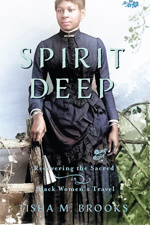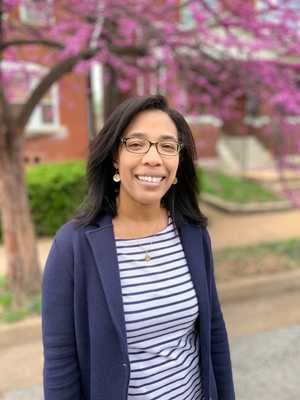Today, we are happy to bring you our conversation with Tisha M. Brooks, author of SPIRIT DEEP: Recovering the Sacred in Black Women's Travel.
What inspired you to write this book?
The origins of this book are personal and academic. I grew up with a grandmother who traveled and who supported and created opportunities for me to travel, so I knew that Black women traveled but I didn't see this experience reflected in the world—not in the cultural images around me nor in the books I was reading. Spirit Deep started with my love of spiritual autobiography but was deeply informed by my fascination with Black women's travel. When I started exploring nineteenth-century Black women spiritual autobiographers, I was amazed at their mobility and the extent of their travels, especially during a time when the majority of African American women were enslaved or living in contexts that made such travel unlikely or even impossible. I was looking for a book that took seriously Black women's spirituality and travel but couldn't find that book. Toni Morrison initially inspired me to begin writing. I took her seriously when she said, “If there's a book that you want to read, but it hasn't been written yet, then you must write it." She gave me permission to write the book I wanted to read.
What did you learn and what are you hoping readers will learn from your book?
The importance of pushing beyond my comfort zone as a scholar and bridging disciplinary divides. Readers may be surprised that this book isn't just about the nineteenth century and I hope they learn the value of reading across time periods and discover how the stories we tell about the past informs our present.
What surprised you the most in the process of writing your book?
I am most surprised by the evolution of the book to include such a variety of genres (biblical narrative, spiritual autobiography, travel narrative, film). My favorite discovery, one that I hope readers will make as well, is that sacred and secular texts can and should speak to each other and that all of them can teach us something crucial about the significance of faith in the face of despair.
What’s your favorite anecdote from your book?
My favorite moment is Hagar's encounter with God in the wilderness in the book of Genesis. During that encounter, God's first question to Hagar is "Where have you come from and where are you going?" This moment reveals the centrality of storytelling to our human experience but also to our understanding of the sacred. God and Hagar's encounter in the wilderness demonstrates for me the link between spirituality and travel. As I argue in the book, identity is fundamentally tied to place. Therefore, we cannot begin to talk about or make sense of who we are and our relationship to the divine unless we take seriously our movements through the world.
What’s next?
Right now, I'm embracing opportunities to talk about the book with various audiences, and I'm excited about the new connections enabled by this publication. I am also using what I've learned about writing from this book creation journey to mentor and support graduate students and faculty in more intentional ways through the writing process. There is also space for new projects as well. I'm working on a collaborative project with a colleague focused on teaching Toni Morrison's nonfiction works and I'm in the beginning stages of research for a project on Morrison as a public intellectual. The best part about completing a book is having increased time for exploratory reading, which for me includes a range of genres at the moment: Camille Dungy's anthology of African American poetry, Black Nature; Viola Davis' memoir, Finding Me; and Wil Gafney's A Woman's Lectionary for the Whole Church. There's no telling where this exploration will take me.





